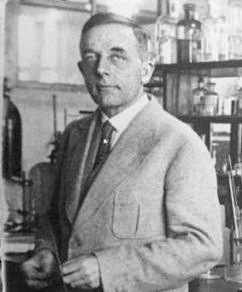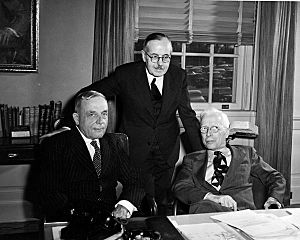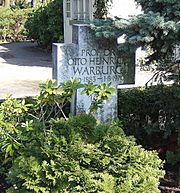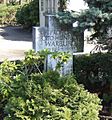Otto Heinrich Warburg facts for kids
Quick facts for kids
Otto Heinrich Warburg
|
|
|---|---|
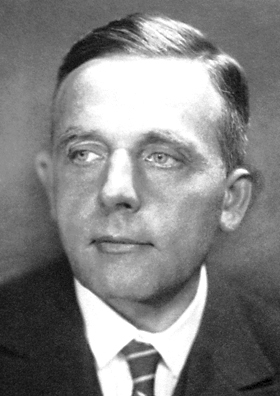
Otto Heinrich Warburg
|
|
| Born | 8 October 1883 |
| Died | 1 August 1970 (aged 86) |
| Nationality | German |
| Alma mater | University of Berlin University of Heidelberg |
| Known for | Pathogenesis of cancer Warburg hypothesis Warburg effect (oncology) Warburg effect (plant physiology) |
| Awards | Iron Cross 1st class (1918) Nobel Prize in Physiology or Medicine (1931) Pour le Mérite (Civil Class) (1952) Paul Ehrlich and Ludwig Darmstaedter Prize (1962) Foreign Member of the Royal Society |
| Scientific career | |
| Fields | Cell biology |
| Institutions | Kaiser Wilhelm Institute for Biology |
| Doctoral advisor | Emil Fischer Ludolf von Krehl |
Otto Heinrich Warburg (8 October 1883 – 1 August 1970) was a famous German scientist. He was a physiologist (someone who studies how living things work), a doctor, and a Nobel Prize winner. He is best known for his important discoveries about how cells get energy, especially cancer cells.
Warburg was also a brave soldier. He served as an officer in a cavalry regiment during World War I. He even received the Iron Cross for his courage. In 1931, he won the Nobel Prize in Physiology or Medicine all by himself. This was a huge honor! He was nominated for this award 47 times during his career.
Contents
Otto Warburg's Early Life and Education
Otto Heinrich Warburg was born in 1883 in a town called Freiburg im Breisgau, near the Swiss border. His mother came from a family of bankers. His father, Emil Warburg, was a well-known physicist. Emil Warburg was part of the famous Warburg family.
Otto Warburg loved to learn. He first studied chemistry under a scientist named Emil Fischer. He earned his first doctorate degree in chemistry in Berlin in 1906. Then, he continued his studies under Ludolf von Krehl and became a medical doctor in Heidelberg in 1911.
Between 1908 and 1914, Warburg worked at the Naples Marine Biological Station in Italy. There, he did a lot of research. He stayed friends with the director's family for his whole life.
Otto Warburg loved horses and was a skilled rider. He joined the Uhlans, a cavalry unit, and fought on the front lines during World War I. He earned the Iron Cross for his bravery. Warburg later said that this experience taught him a lot about "real life" outside of studying. Near the end of the war, Albert Einstein, a friend of Warburg's father, encouraged him to leave the army and go back to science. Einstein believed it would be a great loss if Warburg didn't use his talents. Later, Einstein and Warburg became friends. Einstein's ideas in physics even influenced Warburg's work in biochemistry.
Groundbreaking Scientific Discoveries
While working at the Marine Biological Station, Warburg studied how sea urchin eggs use oxygen. He found that after an egg is fertilized, it uses up to six times more oxygen! His experiments also showed that iron is very important for the baby sea urchin to grow.
In 1918, Warburg became a professor at the Kaiser Wilhelm Institute for Biology in Berlin. By 1931, he became the director of the Kaiser Wilhelm Institute for Cell Physiology. This institute was created with money from the Rockefeller Foundation.
Warburg spent a lot of time studying how tumors (growths) get their energy. He also looked at how normal cells "breathe" or get energy. In 1931, he won the Nobel Prize in Physiology or Medicine for finding out how a special "respiratory enzyme" works. He discovered that animal tumors make a lot of lactic acid. This award came after he was nominated 46 times over nine years!
Another Nobel Prize winner, George Wald, studied with Warburg from 1932 to 1933. During this time, Wald discovered vitamin A in the retina (the part of the eye that senses light).
Working During Difficult Times
When the Nazis came to power in Germany, many people of Jewish background lost their jobs. Warburg had a Protestant mother and a father with Jewish heritage who had converted to Protestantism. Because of this, the Nazis considered him a "half-Jew."
Despite the risks, Warburg was allowed to continue his research. In 1941, he briefly lost his job because he said things that criticized the Nazi government. But, he was able to get his research position back quickly, thanks to a special order. The Nazis were willing to let Warburg work because they were very interested in his research on how cells get energy and how cancer develops. Adolf Hitler himself was very concerned about cancer.
Warburg did not agree with the Nazi government. He even refused to give the Nazi salute, which sometimes caused trouble with their officers. People have wondered why he stayed in Germany during this time. Some think he didn't realize how bad things would get. Others believe he was so dedicated to his scientific work that he was willing to stay and tolerate the difficult situation. One story tells that Warburg's advice to someone having a hard time was: "Don't think about anything but science - think about absolutely nothing else - only science."
In 1943, Warburg moved his laboratory to a village outside Berlin to avoid air raids during the war. The Rockefeller Foundation offered to keep funding his work if he moved to another country. After the war, Warburg asked about moving to the United States, but he was not allowed to.
Nominated for Another Nobel Prize
In 1944, Warburg was nominated for a second Nobel Prize. This was for his work on nicotinamide and how enzymes help with fermentation. Some people thought he was chosen to win that year, but that Adolf Hitler's government stopped him. However, the Nobel Foundation says this rumor is not true. While he was a strong candidate, he was not selected for the prize that year.
Three scientists who worked in Warburg's lab later won Nobel Prizes themselves. One of them was Sir Hans Krebs, who discovered the Krebs cycle (also called the citric acid cycle).
Warburg's work on plant physiology (how plants work), cell metabolism (how cells get energy), and oncology (the study of cancer) made him a very important figure in science. He helped develop systems biology, which looks at how all parts of a living system work together. He also worked on photosynthesis, the process plants use to make food from sunlight.
Warburg's Cancer Idea
Warburg had a big idea about how cancer grows. He thought that cancer cells get most of their energy by breaking down glucose (a type of sugar) without using oxygen. This process is called fermentation. He believed this was different from healthy cells, which mostly get energy by using oxygen to break down pyruvate. Pyruvate comes from glucose and is processed in the mitochondria (the "powerhouses" of the cell). So, Warburg thought that cancer was caused by a problem with the mitochondria.
Warburg kept doing experiments to test his idea and gave many talks about it.
Today, scientists believe that changes in genes (called mutations) are what cause cancer. The changes in how cancer cells get energy, which Warburg studied, are now thought to be a *result* of these gene changes, not the main cause.
However, Warburg's ideas were very important. They made other scientists curious and led to a lot more research into how cancer cells get energy. While Warburg's idea might have been a bit too simple, it definitely inspired a whole field of study!
Later Life
Otto Warburg wrote important books about his work, including The Metabolism of Tumours (1931) and New Methods of Cell Physiology (1962). He was very happy when Oxford University gave him an honorary doctorate. He also received the Pour le Mérite award in 1952. He was known for asking officials to mail him his medals so he wouldn't have to attend ceremonies, as he preferred to stay in his laboratory.
When people didn't accept his ideas right away, Warburg liked to quote a saying from another famous scientist, Max Planck: "Science advances one funeral at a time." This meant that new ideas often only become fully accepted when older scientists, who might resist them, are no longer around.
Warburg was very sure about his own findings. He worried that the constant search for new cancer causes or viruses would stop people from taking steps to prevent cancer.
Warburg lived and worked at the Kaiser Wilhelm Institute with his long-time assistant and manager, Jacob Heiss. Warburg continued his research until he was 86 years old. He passed away in 1970 from a pulmonary embolism (a blood clot in the lung) after breaking his leg. He was buried in a Christian cemetery.
The Otto Warburg Medal
The Otto Warburg Medal is a special award given to remember Warburg's amazing work. The German Society for Biochemistry and Molecular Biology has given out this medal since 1963. It honors and encourages new discoveries in biochemistry and molecular biology. The Otto Warburg Medal is considered the highest award for biochemists and molecular biologists in Germany.
Images for kids
See also
 In Spanish: Otto Heinrich Warburg para niños
In Spanish: Otto Heinrich Warburg para niños
- Warburg effect inversion
- Oncometabolism
 | John T. Biggers |
 | Thomas Blackshear |
 | Mark Bradford |
 | Beverly Buchanan |


